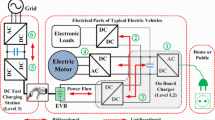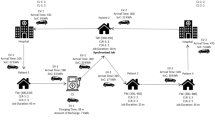Abstract
Charging-cost minimization has been identified as an effective motivation for EV users to relinquish their charging autonomy and participate in centralized energy management programs. It has become increasingly common to include technical constraints in cost-based charging strategies to ensure that the distribution network’s loading limits are not violated. However, the higher operational security entails greater computational complexity as these constraints are based on nonlinear power flow equations. The resultant rise in execution time could hinder real-time implementation and is usually overcome by simplifying the problem formulation with convenient assumptions. These simplifications result in approximation of the solution space and potential loss of the global optimum. A possibility of avoiding such complications exists in systems that employ dynamic tariffs, in which electricity price varies as a function of system demand and cost reduction is equivalent to load regulation. As cost-saving strategies shift EV charging from expensive peak-load hours to the cheaper off-peak hours, they are able to reduce network congestion and thereby the likelihood of unacceptable operating conditions. This paper attempts to analyze the regulative action inherent in cost minimization and develop a method to assess the need for technical constraints in economic optimization of EV charging. In order to deal with the stochastic nature of EV charging and its impact on the network, the proposed method simulates the worst-case charging scenario. The worst-case analysis enables the system operator to quantify the maximum corrective action that can be imparted by the cost-minimizing action and examine its adequacy.












Similar content being viewed by others
References
Global EV Outlook (2020) Entering the decade of electric drive. International Energy Agency; 2020
Fernandes C, Frías P, Latorre JM (2012) Impact of vehicle-to-grid on power system operation costs: the Spanish case study. Appl Energy 96:194–202
Solanke TU, Ramachandaramurthy VK, Yong JY, Pasupuleti J, Kasinathan P, Rajagopalan A (2020) A review of strategic charging-discharging control of grid-connected electric vehicles. J Energy Storage 28:10119101193
Deb S, Tammi K, Kalita K, Mahanta P (2018) Impact of electric vehicle charging station load on distribution network. Energies 11(1):178
Erdogan N, Erden F, Kisacikoglu M (2017) A fast and efficient coordinated vehicle-to-grid discharging control scheme for peak shaving in power distribution system. J Mod Power Syst Clean Energy 6(3):555–566
Kisacikoglu MC, Erden F, Erdogan N (2017) Distributed control of PEV charging based on energy demand forecast. IEEE Trans Ind Inform 14(1):332–341
Crozier C, Deakin M, Morstyn T, McCulloch M (2020) Coordinated electric vehicle charging to reduce losses without network impedances. IET Smart Grid 3(5):677–685
Dubey A, Santoso S (2015) Electric vehicle charging on residential distribution systems: impacts and mitigations. IEEE Access 3:1871–1893
Islam MR, Lu H, Hossain J, Li L (2020) Multiobjective optimization technique for mitigating unbalance and improving voltage considering higher penetration of electric vehicles and distributed generation. IEEE Syst J 14(3):3676–3686
Chen N, Tan CW, Quek TQ (2014) Electric vehicle charging in smart grid: optimality and valley-filling algorithms. IEEE J Sel Top Signal Process 8(6):1073–1083
Ayyadi S, Bilil H, Maaroufi M (2019) Optimal charging of electric vehicles in residential area. Sustain Energy Grids and Netw 19:100240
Veldman E, Verzijlbergh RA (2014) Distribution grid impacts of smart electric vehicle charging from different perspectives. IEEE Trans Smart Grid 6(1):333–342
He Y, Venkatesh B, Guan L (2012) Optimal scheduling for charging and discharging of electric vehicles. IEEE Trans Smart Grid 3(3):1095–1105
Jin C, Tang J, Ghosh P (2013) Optimizing electric vehicle charging: a customer’s perspective. IEEE Trans Veh Technol 62(7):2919–2927
Liu M, Mcnamara P, Shorten R, Mcloone S (2015) Residential electrical vehicle charging strategies: the good, the bad and the ugly. J Mod Power Syst Clean Energy 3(2):190–202
Sharma I, Canizares C, Bhattacharya K (2014) Smart charging of PEVs penetrating into residential distribution systems. IEEE Trans Smart Grid 5(3):1196–1209
Song Y, Zheng Y, Hill DJ (2016) Optimal scheduling for EV charging stations in distribution networks: a convexified model. IEEE Trans Power Syst 32(2):1574–1575
Wang Y, Infield D, Gill S (2017) Smart charging for electric vehicles to minimise charging cost. Proc Inst Mech Eng Part A J Power Energy 231(6):526–534
De Hoog J, Alpcan T, Brazil M, Thomas DA, Mareels I (2015) Optimal charging of electric vehicles taking distribution network constraints into account. IEEE Trans Power Syst 30(1):365–375
O’Connell A, Flynn D, Keane A (2014) Rolling multi-period optimization to control electric vehicle charging in distribution networks. IEEE Trans Power Syst 29(1):340–348
Zhang J, Cui M, Li B, Fang H, He Y (2019) Fast solving method based on linearized equations of branch power flow for coordinated charging of EVs (EVCC). IEEE Trans Veh Technol 68(5):4404–4418
Patil H, Kalkhambkar VN (2019) Charging cost minimisation by centralised controlled charging of electric vehicles. Int Trans electr Energy Syst 30(2):e12226
Franco JF, Rider MJ, Romero R (2015) A mixed-integer linear programming model for the electric vehicle charging coordination problem in unbalanced electrical distribution systems. IEEE Trans Smart Grid 6(5):2200–2210
Sortomme E, Hindi MM, MacPherson SJ, Venkata S (2010) Coordinated charging of plug-in hybrid electric vehicles to minimize distribution system losses. IEEE Trans Smart Grid 2(1):198–205
Li Y, Han M, Yang Z, Li G (2021) Coordinating flexible demand response and renewable uncertainties for scheduling of community integrated energy systems with an electric vehicle charging station: a bi-level approach. IEEE Trans Sustain Energy 12(4):2321–2331
Kristoffersen TK, Capion K, Meibom P (2011) Optimal charging of electric drive vehicles in a market environment. Appl Energy 88(5):1940–1948
Visakh A, Selvan MP (2022) Energy-cost minimization with dynamic smart charging of electric vehicles and the analysis of its impact on distribution-system operation. Electr Eng 104(5):2805–2817
Verzijlbergh RA, Grond MO, Lukszo Z, Slootweg JG, Ilic MD (2012) Network impacts and cost savings of controlled EV charging. IEEE Trans Smart Grid 3(3):1203–1212
IEEE Power & Engineering Society (2011) IEEE Guide for Loading Mineral-Oil-Immersed Transformers
Shahnia F, Ghosh A, Ledwich G, Zare F (2013) Predicting voltage unbalance impacts of plug-in electric vehicles penetration in residential low-voltage distribution networks. Electr Power Compon Syst 41(16):1594–1616
Pillay P, Manyage M (2001) Definitions of voltage unbalance. IEEE Power Eng Rev 21(5):50–51
Jian L, Zhu X, Shao Z, Niu S, Chan C (2014) A scenario of vehicle-to-grid implementation and its double-layer optimal charging strategy for minimizing load variance within regional smart grids. Energy Convers Manag 78:508–517
U S Energy Information Administration (EIA) - Independent Statistics and Analysis.: Prices and factors affecting prices. Available from:https://www.eia.gov/energyexplained/electricity/prices-and-factors-affecting-prices.php
Clement-Nyns K, Haesen E, Driesen J (2009) The impact of charging plug-in hybrid electric vehicles on a residential distribution grid. IEEE Trans Power Syst 25(1):371–380
CVX Research, Inc .: CVX: Matlab Software for Disciplined Convex Programming, version 2.0.http://cvxr.com/cvx
EN50160 (2001) Voltage characteristics of electricity supplied by public distribution systems. CENELEC
Sarker MR, Olsen DJ, Ortega-Vazquez MA (2017) Co-optimization of distribution transformer aging and energy arbitrage using electric vehicles. IEEE Trans Smart Grid 8(6):2712–2722
Qian K, Zhou C, Allan M, Yuan Y (2010) Modeling of load demand due to EV battery charging in distribution systems. IEEE Trans Power Syst 26(2):802–810
Author information
Authors and Affiliations
Corresponding author
Ethics declarations
Conflict of interest
The authors have no relevant financial or non-financial interests to disclose.
Additional information
Publisher's Note
Springer Nature remains neutral with regard to jurisdictional claims in published maps and institutional affiliations.
Rights and permissions
Springer Nature or its licensor (e.g. a society or other partner) holds exclusive rights to this article under a publishing agreement with the author(s) or other rightsholder(s); author self-archiving of the accepted manuscript version of this article is solely governed by the terms of such publishing agreement and applicable law.
About this article
Cite this article
Visakh, A., Manickavasagam Parvathy, S. Assessing the need for network-based technical constraints in economic optimization of electric vehicle charging. Electr Eng 105, 1629–1641 (2023). https://doi.org/10.1007/s00202-023-01764-z
Received:
Accepted:
Published:
Issue Date:
DOI: https://doi.org/10.1007/s00202-023-01764-z




